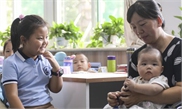
A child plays at a park in Beijing. File photo/Xinhua
After relaxation of China’s family planning policy to allow couples to have a third child, a number of cities have conducted surveys on families’ willingness to have a third child, which showed that the policy is more preferable for families aged from 30 to 40.The surveys have recently been carried out in cities such as in East China’s Zhejiang, Jiangxi, Shandong, Southwest China’s Sichuan, and Northwest China’s Shaanxi provinces.
Experts said national-level surveys on fertility intentions are unlikely to be carried out, but the small-scale polls will serve as a reference to optimize the country’s birth policy, improve the population structure and provide reference for policy-makers to address family concerns.
A survey by the investigation team of the National Bureau of Statistics in Xi’an, Northwest China’s Shaanxi showed nearly 90 percent of young people of childbearing age are unwilling to have a third child mainly due to high upbringing expenditure.
Among the surveyed 100 young people of childbearing age in Xi’an, only 8 percent would be willing to have a third child, according to local media Sanqin Daily.
The survey also showed that elderly people are more open to having a third child.
People aged between 35 and 40 have a relatively stronger desire to have a third child as they have a relatively stable economic foundation to have more children. This is in contrast to people aged 20-25, 25-30 and 30-35, with the percentages at 15.4 percent, 10 percent, 12.8 percent and 14.3 percent, respectively.
Another similar survey by the investigation team of the National Bureau of Statistics in Jinan, capital city of Shandong, carried out in early June among 36 families also showed middle-aged families generally have stronger willingness to have a third child. The desire to have a third child in rural families is at 6.9 percent higher than those from cities.
The percentage of those who said their family income could afford three children or more is only 4.4 percent and 46.3 percent of the surveyed said they could only afford one child.
China announced the policy at end of May and it came after the release of 7th national census result that showed that the number of the country’s newborns declined for four years straight.
Chinese demographers believe the new move is not just targeting the birth plan, but a significant step leading to more policy changes in improving China’s demographic structure and actively responding to the aging trend.
The surveys are all pointing to the fact that the Chinese public generally has low desire to have a third child, Dong Yuzheng, the head with Guangdong Academy of Population Development, was quoted by yicai.com.
Dong believes those polls will help the government to introduce more supporting policies on birth control and address public concerns over the family child policy. Cui Shuyi, head of the Institute of Demography, Shandong Academy of Social Sciences, was cited by Jiemian.com as saying that national-level surveys on the issue are unlikely to take place.
Global Times


